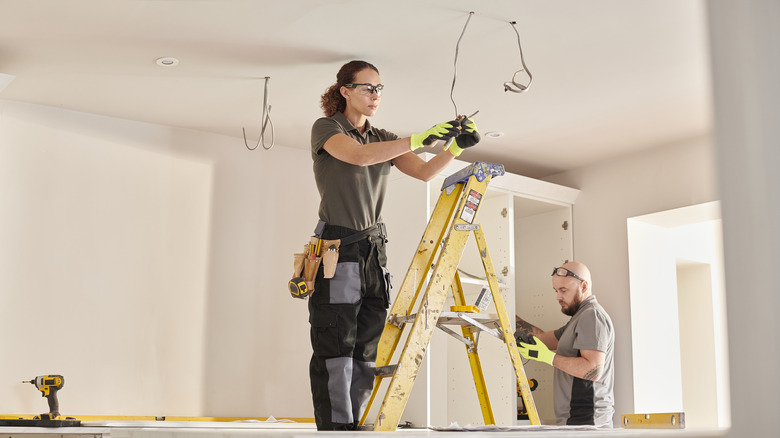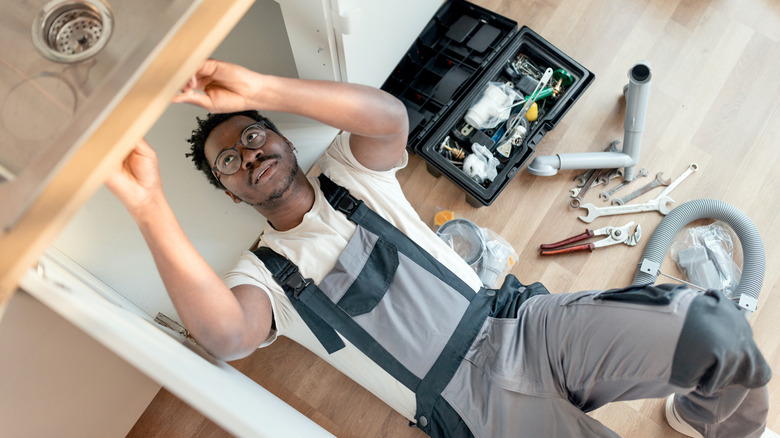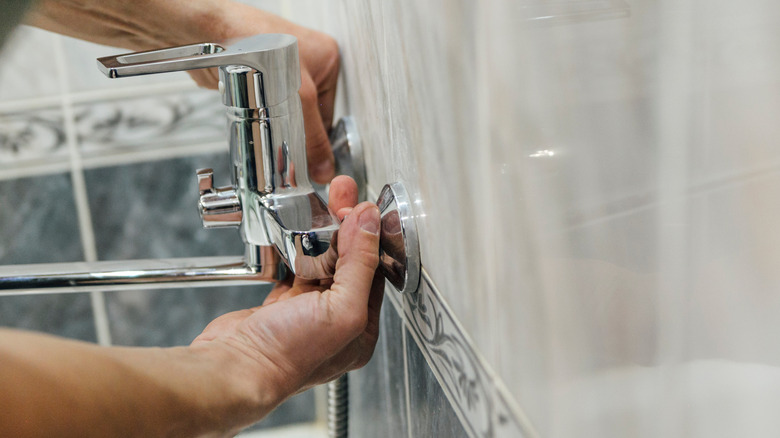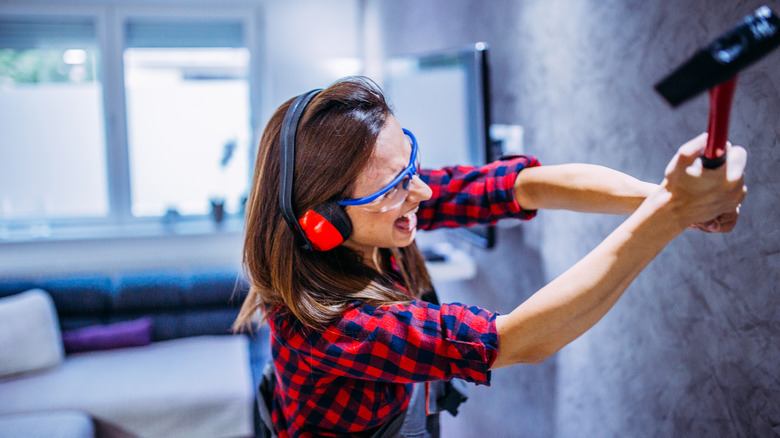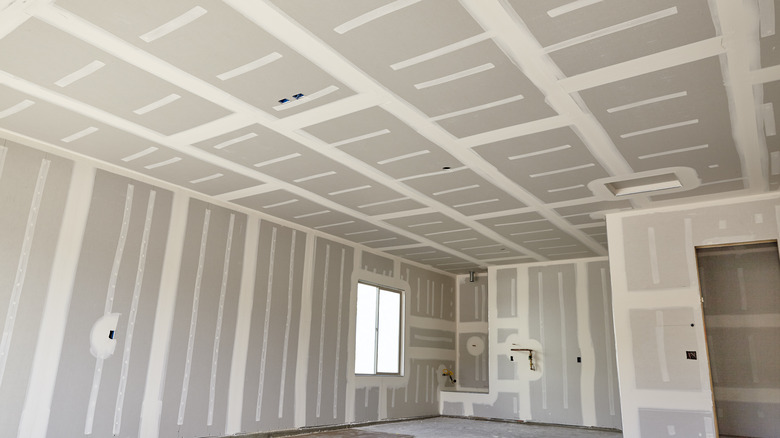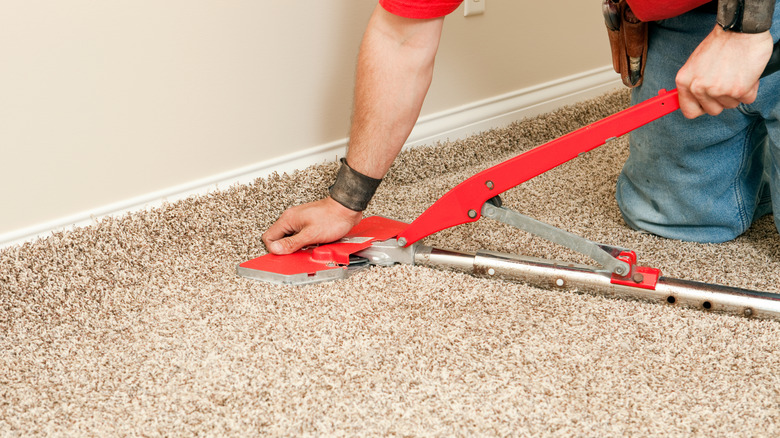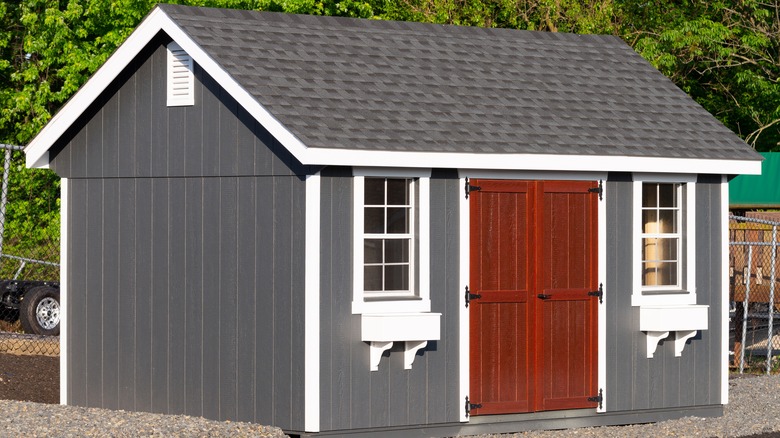Home Improvement Projects That Are Better Left To The Professionals, According To Our Experts
When updating your home, it can be difficult to know which projects to leave to the professionals and which are safe for you to complete on your own. Luckily, we've taken the guesswork out of it and gathered these exclusive insights for our readers by interviewing the top experts in home renovation and design. Of course, there are a few caveats to the advice. Some work is best completed by contractors because of safety issues. If done incorrectly, you might burn your house down, crack its foundation, or create a harmful infestation of black mold. Other projects are simply recommended to be handed over to the pros to ensure the quality of the final results. As in, sure, you might be able to DIY it, but it's not going to look very good if you do — not without lots of practice, at least.
Our experts are here to offer you the information you need to make an informed decision. You can weigh up the risks, amount of money needed, and skillset involved for each task and go from there. This way, you can make the best choice for your safety — and your wallet.
Only a certified electrician can safely keep your home's wiring up to code
When renovating your house, if you plan on doing any electrical work, it is best to bring in a professional to keep things safe. This would be things like moving power points, installing switches, or even putting in ceiling fans where they weren't before. The reason for this is the ever-elusive National Electrical Code or NEC. The NEC is a standard set by the National Fire Protection Association and adjusted to suit regional needs by local governments. As new knowledge becomes available, the code might be updated. "Code is constantly changing and you as a homeowner won't be up to speed on the current code," Jeff Thorman, Founder and Host of Home RenoVision DIY told House Digest in an exclusive interview.
If you don't have the room in your budget or already have extensive DIY experience with electric work, there may be a small workaround in some locations. "The exception is when you live in an area that allows homeowners to pull homeowner electrical permits," Thorman said. "This allows for a professional to come in and inspect your work to make sure it is up to code." By doing it this way, you might be able to save a little bit of money on materials and labor, but still rest easy knowing your home is safe and professionally certified.
DIY plumbing work often causes more problems than it fixes
Having clean water available is so essential to our quality of life that the United Nations has even recognized it as a human right. Landlords must provide their tenants with running water at all times and homeowners can't go without it, either. While you might be able to go a few days without power, not being able to flush the toilet or having a poorly installed pipe spraying water everywhere is more than just an inconvenience. Because of this, you should leave plumbing work to the professionals. "Most homeowners do not have the right tools or training to successfully complete a plumbing job. Plumbing is an area you don't want to experiment or learn on the job with," Thorman told us.
While you might feel like you can fix a leaky toilet or patch a split pipe after a blizzard, there are real risks that come with this. "When you make a mistake on a plumbing job you may not know for months and in that scenario, you've created a larger (and more costly) problem to fix," Thorman said. However, there is one exception he believes might save you a little bit of cash in a pinch. "If you are confident in your plumbing skills, you may consider hiring a plumber to do the rough work and finish the job yourself in order to save money."
Hire a professional to waterproof your shower, as water damage is an expensive pain
Water damage is an expensive and annoying problem to have. The mold it creates can also be a significant risk to your health. Because of this, "when it comes to remodeling your shower it's best to hire a professional for all the waterproofing," Contractor Mike Rose with MTR Construction Inc. told House Digest in an exclusive interview. "There are companies that specialize in waterproofing the shower pan called 'Hot Mop.'" Essentially, these professionals use layers of tar paper along with liquid or hot tar to create a durable and leak-proof shower. Because of the extreme temperatures, it's a dangerous process that requires lots of practice to get right. You don't want to risk your safety just to complete the task incorrectly and have a leaky shower.
Plus, professional tile contractors can also effectively waterproof shower walls before the tiling process even starts. They know how to use proper paper and flashing to prevent future damage or problems. "These might seem like small projects, but not done correctly, can result in major issues down the line," Rose warned. These problems might be small, like cosmetic mildew damage, but they also might be significant, like rotting of your home's wooden support beams if the shower is on the second floor, and deterioration of drywall — causing major structural problems and the potential for cave-ins and collapses.
Don't put your safety at risk with shoddy structural work
Cosmetic improvements to your home like repainting the hallways, adding shutters to the windows, or even crafting built-in storage in your office are great DIY projects. Anything that might compromise your safety by altering the home's structure should best be left to the professionals. "I always want a structural engineer to come in if I am considering changing anything structural," Thorman said. For example, you might take down a dividing wall to open up your floorplan, only to discover that it was a load-bearing wall and your roof is in danger of caving in.
"Safety is important, this is not the place to save a few bucks," says Thorman. If hiring a structural engineer for your project simply isn't in the budget, take a moment to think about the kind of changes you can make without one. Risking a cracked foundation or a cave-in down the road isn't worth the savings of doing any structural work without the proper professional supervision.
Drywall taping and mudding require a lot of skill to be done correctly
You might have heard of drywall mudding, sometimes called joint compound application as something you can DIY, but this isn't really true. It's a crucial step in finishing up drywall installation. Yet it's a lot harder than it looks. "This is an art form better left to a professional who has experience. It takes practice and skill to tape and mud a flat wall or ceiling," Kate Chipinski, Designer, Home Renovator, and Artist told House Digest during an exclusive interview. "Even if you are a skilled DIYer it can be a challenge, so I always like to hire this one out."
The process is the application of a joint compound, commonly referred to as "mud," over the joints and screws of drywall panels. This step creates a smooth and seamless surface. It is essential to finishing off interior renovations as it conceals the gaps between adjacent drywall panels and covers the fasteners used to secure them. The final polished appearance is then ready for painting or other finishing touches. If you are determined to DIY the process, it is perfectly safe to do so; however, you just might have to live with a lumpy wall at the end of a hard day's work.
Installing carpeting is more tricky than you might imagine
If you are deep into DIY trends on social media, it might seem like laying your flooring, be it carpeting, tiles, or anything in between is pretty easy. According to Thorman, it is anything but, especially without the right equipment. "You are only as successful as the tools you have," he shared. "This one may come as a surprise as people often think installing carpet is an easy DIY, but installing carpet is hard work. Most homeowners often do not have the proper tools to achieve professional results."
The kind of tools needed are a carpet stretcher, a knee kicker, carpet tack strips, and an industrial stapler, among other things. Since you can obtain these items at most home improvement stores, the allure of DIY might be too much to resist. "If you decide to DIY carpet install, make sure you rent the proper tools and equipment to get professional results," Thorman shared. Taking the time to practice with the tools before you are working on the final product can also improve your results. This way you don't waste money ruining the carpet you purchase, but can work out the kinks on scraps, instead. However, the best bet is to still hire professionals, but do their prep work for them, so the time they spend on-site is less.
Consider the need to save yourself time instead of just money
When we DIY home renovations, it's easy to become so focused on saving money that we forget about our other much more limited resource: Our time. If you are weeks into a project and just can't make any progress, or feel like your work is taking away from your time with family or much-needed rest, consider bringing in professional reinforcements. "You splurge and save in all things DIY and I like to weigh the time vs. money component," Chipinski told us. "For instance, we recently had a shed made and delivered to our property. Could we have made and finished one, yes, would it have taken a lot of our time during the short summer months, yes!"
In this case, having some free time in the nice weather was a bit more important to her than hours of toiling in the hot sun. However, she understands that not everyone has the budget to completely divorce themselves from DIY — luckily there is a great in-between option. "When it comes to the shed, the homeowner could buy a kit to cut some costs," she said. "This way they don't have to be expert DIYers to build one from scratch and they can cut some costs by building their own from the kit."

